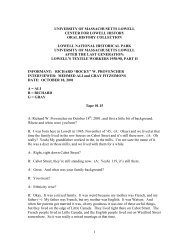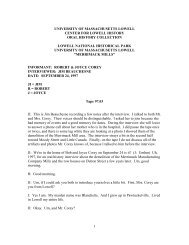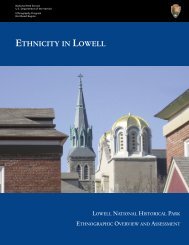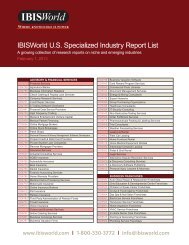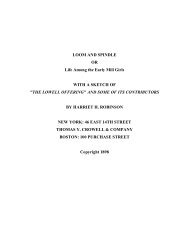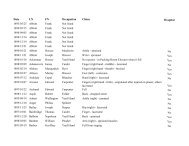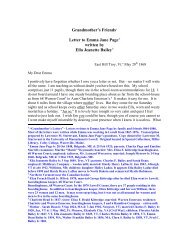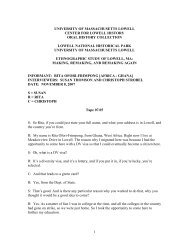Coffey, Dennis 03.09 - University of Massachusetts Lowell Libraries
Coffey, Dennis 03.09 - University of Massachusetts Lowell Libraries
Coffey, Dennis 03.09 - University of Massachusetts Lowell Libraries
You also want an ePaper? Increase the reach of your titles
YUMPU automatically turns print PDFs into web optimized ePapers that Google loves.
But I mean I was just a pee-on you know. So I rode with Tim Mellon in a helicopter. So<br />
what, you know. She was right, you know, you and me we are not part <strong>of</strong> the power elite.<br />
(A: Umhm) We can have a role, we can do some things, we can, we can maybe make a<br />
contribution one way or another, (A: Umhm) but you know, the real power in this<br />
country is that compressed 1% that has all the money. (A: Yah, yah) You know. And<br />
it’s so true when you look at Washington today, you know.<br />
A: Right. And so taking that to the local level, what was your sense <strong>of</strong> that power<br />
structure back in the 70’s, late 70’s?<br />
D: You know what I saw were the political elite power structure that you know, was very<br />
narrow minded [loud ticking sound on tape], that saw you know, had a vision <strong>of</strong> the city<br />
that was so totally different from the real needs <strong>of</strong> the city. That had, that plays no value<br />
in the, in the history, the architecture, the art community and culture <strong>of</strong> the community.<br />
You know, the only value they saw was get some federal bucks in here, do some urban<br />
renewal, you know, and then you know, we’ll see what happens. But that changed and I<br />
think it was Pat Mogan and the evolution <strong>of</strong> the State and National Parks, that got the<br />
power elite to actually sit up and take notice. Just as I mentioned earlier about my Uncle<br />
Reggie’s perspective on Jack Kerouac [loud ticking sound again], and how that changed<br />
over time, I think the power structure eventually evolved. And I think that is where Paul<br />
Tsongas played a very critical role, and that the <strong>Lowell</strong> Plan, (A: Yah) because he knew<br />
about that power structure that I didn’t know about. (A: Yah) And he said, “How do I<br />
get that power structure to play a role in this thing?” And the <strong>Lowell</strong> Plan was the<br />
answer.<br />
A: Okay.<br />
D: And you know, he was able to get those people and say, “Look it, this is, this is what<br />
we got to do. You got to play a part in this.” And ah (--)<br />
A: How was he able to do that, if you have an understanding <strong>of</strong> that?<br />
D: Well I think um, [forceful] personality in this case. I mean here he was a Democrat,<br />
most <strong>of</strong> them were Republicans. But I think Brad Morse stayed in touch with Paul. I<br />
don’t know this for a fact, but my sense is that Brad and Paul communicated, because<br />
Brad still had some vested interest in the Park and so forth. And I think Brad helped Paul<br />
to get to the right people, (A: Really) and shape it up, you know. Because looking back,<br />
as I think about the things Paul was doing, and at the time I was saying, “Gee, what’s he<br />
hanging out with them for?” But now it you know, you can see.<br />
A: Did you have at that point have kind <strong>of</strong> a camp mentality like, “Old those are the old<br />
people, and we don’t even need to worry about them,” kind <strong>of</strong> a thing.<br />
D: Yah perhaps. Perhaps. Yah, yah, because we were young and you know, foolish.<br />
[Both laugh] Yah, and yet Paul Tsongas was able to say, “Okay, we got to bring them<br />
into the camp,” you know, and he did. And that’s the amazing thing about why this<br />
18



